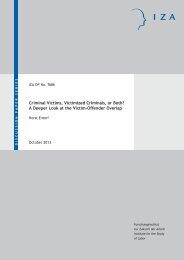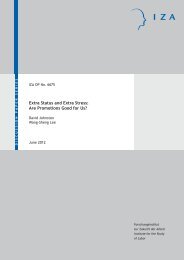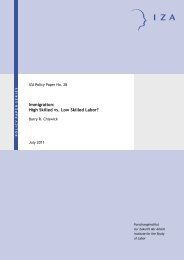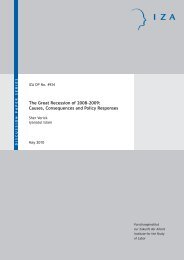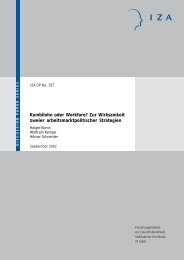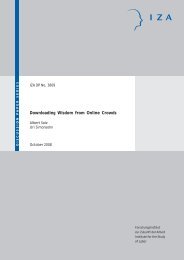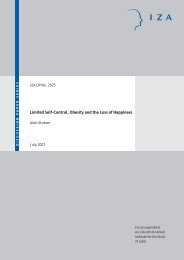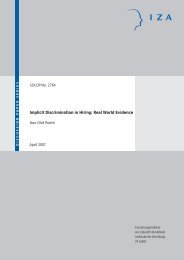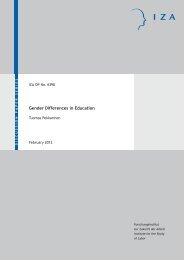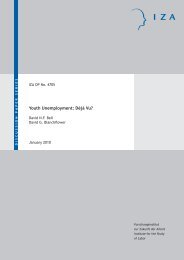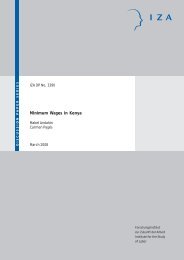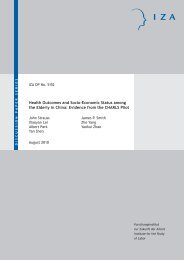Shadow Economies and Corruption All Over the World - Index of - IZA
Shadow Economies and Corruption All Over the World - Index of - IZA
Shadow Economies and Corruption All Over the World - Index of - IZA
You also want an ePaper? Increase the reach of your titles
YUMPU automatically turns print PDFs into web optimized ePapers that Google loves.
laws <strong>and</strong> regulations <strong>and</strong> less bribery facing enterprises. Countries with a better rule <strong>of</strong> <strong>the</strong><br />
law, which is financed by tax revenues, also have smaller shadow economies. Transition<br />
countries have higher levels <strong>of</strong> regulation leading to a significantly higher incidence <strong>of</strong><br />
bribery, higher effective taxes on <strong>of</strong>ficial activities <strong>and</strong> a large discretionary framework <strong>of</strong><br />
regulations <strong>and</strong> consequently to a higher shadow economy. Their overall conclusion is that<br />
“wealthier countries <strong>of</strong> <strong>the</strong> OECD, as well as some in Eastern Europe find <strong>the</strong>mselves in <strong>the</strong><br />
‘good equilibrium’ <strong>of</strong> relatively low tax <strong>and</strong> regulatory burden, sizeable revenue mobilization,<br />
good rule <strong>of</strong> law <strong>and</strong> corruption control, <strong>and</strong> [relatively] small un<strong>of</strong>ficial economy. By<br />
contrast, a number <strong>of</strong> countries in Latin American <strong>and</strong> <strong>the</strong> Former Soviet Union exhibit<br />
characteristics consistent with a ‘bad equilibrium’: tax <strong>and</strong> regulatory discretion <strong>and</strong> burden<br />
on <strong>the</strong> firm is high, <strong>the</strong> rule <strong>of</strong> law is weak, <strong>and</strong> <strong>the</strong>re is a high incidence <strong>of</strong> bribery <strong>and</strong> a<br />
relatively high share <strong>of</strong> activities in <strong>the</strong> un<strong>of</strong>ficial economy.“ (Johnson, Kaufmann <strong>and</strong> Zoido-<br />
Lobatón 1998a p. I). First results <strong>of</strong> corruption on <strong>the</strong> shadow economy <strong>and</strong> vice versa are<br />
reported in chapter 4.<br />
2.2.4 Public Opinion about <strong>the</strong> <strong>Shadow</strong> Economy<br />
The perception <strong>of</strong> citizen/voters about <strong>the</strong> shadow economy <strong>and</strong> <strong>the</strong>ir (moral) reaction to this<br />
phenomenon is also an important factor, under which circumstances people decide to work in<br />
<strong>the</strong> shadow economy. There are a number <strong>of</strong> empirical studies, which investigate <strong>the</strong> tax<br />
moral <strong>of</strong> people <strong>and</strong> <strong>the</strong>ir attitudes against <strong>the</strong> shadow economy 12 . In this short section some<br />
results for Germany are shown which clearly demonstrate that people have no bad (moral)<br />
feeling when working in <strong>the</strong> shadow economy. In table 2.2 for <strong>the</strong> year 2003 it is investigated,<br />
whe<strong>the</strong>r people regularly work in <strong>the</strong> shadow economy or not. 25 % <strong>of</strong> <strong>the</strong> German<br />
respondents say “yes”, <strong>and</strong> 46 % <strong>of</strong> <strong>the</strong> respondents regularly dem<strong>and</strong> shadow economy<br />
activities. In table 2.3 some reasons are asked, why shadow economy activities are dem<strong>and</strong>ed.<br />
The most important result is, one saves money – or shadow economy activities are much<br />
cheaper than <strong>the</strong> <strong>of</strong>ficial ones. The second most important reason is, that <strong>the</strong> tax <strong>and</strong> social<br />
security burden is too high ( 73 % <strong>of</strong> <strong>the</strong> respondents) <strong>and</strong> reason number 3 is, that due to <strong>the</strong><br />
much higher labour costs in <strong>the</strong> <strong>of</strong>ficial economy, one would not dem<strong>and</strong> this activities.<br />
Especially <strong>the</strong> third answer is interesting, because this result clearly demonstrates that only 23<br />
% <strong>of</strong> <strong>the</strong> dem<strong>and</strong>ed shadow economy activities have substitutive character (i.e. <strong>the</strong>y would<br />
dem<strong>and</strong>ed in <strong>the</strong> <strong>of</strong>ficial economy if <strong>the</strong>re would be no shadow economy) <strong>and</strong> only 9 % <strong>of</strong> <strong>the</strong><br />
12 Compare Halla <strong>and</strong> Schneider (2005), Torgler (2002), Torgler <strong>and</strong> Schneider (2005), Feld <strong>and</strong> Frey (2005),<br />
<strong>and</strong> Feld <strong>and</strong> Larsen (2005).<br />
9



